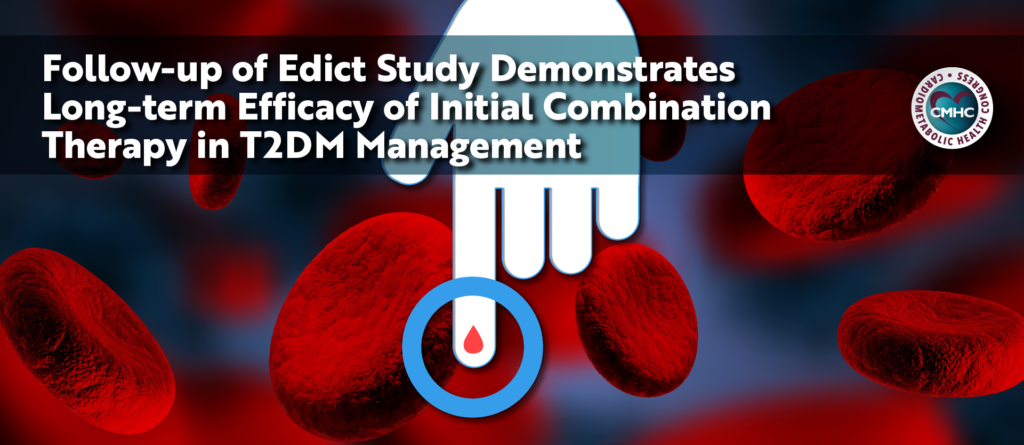Follow-Up of EDICT Study Demonstrates Long-Term Efficacy of Initial Combination Therapy in T2DM Management

Type 2 diabetes mellitus (T2DM) affects approximately 28 million people in the United States and is characterized by hyperglycemia due to insulin resistance and impaired β-cell function. Its prevalence has almost doubled in the last two decades and diabetes costs the economy $245 billion annually; with most of these costs attributed to T2DM. The rapid […]
Finding Common Ground for Glycated Haemoglobin Test Targets

In March of this year, the American College of Physicians (ACP) issued a guidance statement on HbA1c targets for adults with type 2 diabetes (T2D), which have been the subject of debates and discussions in the medical community. At the center of this debate is ACP’s recommendation for a target HbA1c goal between 7-8% to […]
Inflammation and risk of T2DM: Insights from the CANTOS trial
Data from several studies have suggested that persistent low-grade inflammation has an important role in the pathophysiology of many cardiometabolic conditions. Inflammatory markers, such as interleukin-6 (IL-6) and high-sensitivity C-reactive protein (hs-CRP) have been associated with increased risk of cardiovascular adverse events, as well as insulin resistance and hyperglycemia. Canakinumab is a human monoclonal antibody […]
The Co-Occurrence of Diabetes & Heart Disease
The number of people living with diabetes has tripled since 2000, leading to enormous financial ramifications: the global cost of the disease is $850 billion each year. The latest estimates from the International Diabetes Federation indicate that one in 11 adults worldwide have diabetes; most have type 2 diabetes, which is strongly linked to obesity […]
Moderate Drinking May Help Prevent Diabetes
A study published in Diabetologia, conducted by researchers from the National Institute of Public Health of the University of Southern Denmark, suggests that people who drink three to four times a week are less likely to develop type 2 diabetes than those who never drink. The study, which surveyed over 70,000 people on alcohol intake, […]
Biomarkers Could Predict Best Diets
A new study, published in the American Journal of Clinical Nutrition, has indicated two biomarkers that can predict the efficacy of certain diets for weight loss: specifically, for people with prediabetes or diabetes. Through an analysis of over 1,200 adults, researchers discovered that a person’s fasting blood glucose levels, fasting insulin levels, or both, could […]
Type 2 Diabetes and Heart Failure: A Deadly Combination
An in-depth session titled “Heart Failure: The Frequent, Forgotten, and Often Fatal Complication of Type 2 Diabetes” was presented last week at the American Association of Clinical Endocrinology’s 26th Annual Scientific and Clinical Congress. The cited evidence and research pointed to a high frequency of heart failure, accompanied by an increased risk of mortality, for […]
2017 ADA Standards of Medical Care in Diabetes Emphasize Psychological Health and Personalized Treatment Options
The newly published 2017 Standards of Medical Care in Diabetes by the American Diabetes Association emphasize psychological health, access to care, expanded and personalized treatment options, as well as hypoglycemia tracking in patients with diabetes as critical areas of focus. In addition to screening, diagnosis, and treatment options, including metabolic surgery, that will provide better […]
Are We Any Closer to Understanding What’s Driving the Cardiovascular Benefits Seen in EMPA-REG?
Theories abound on what’s driving the cardiovascular benefits seen in EMPA-REG, as an FDA advisory panel votes to support a claim of CV risk reduction on the SGLT-2 inhibitor empagliflozin’s label. An advisory panel to the US FDA has voted, albeit narrowly, to allow the claim that treatment with the SGLT-2 inhibitor epagliflozin reduces the […]
ARB Azilsartan Shows Greater Efficacy in Lowering Blood Pressure Among Patients with Prediabetes and Type 2 Diabetes
ARB Azilsartan Shows Greater Efficacy in Lowering Blood Pressure Among Patients with Prediabetes and Type 2 Diabetes Results of a recent analysis that compared the efficacy, safety, and metabolic effects of the angiotensin-receptor blocker (ARB) azilsartan medoxomil to valsartan and olmesartan separately in patients with prediabetes and type 2 diabetes found that azilsartan (80 mg) […]













